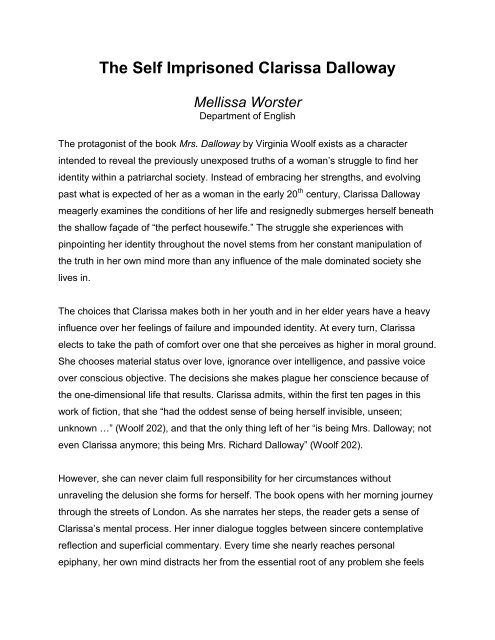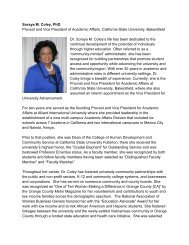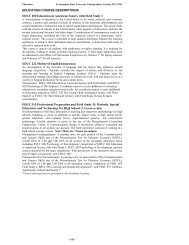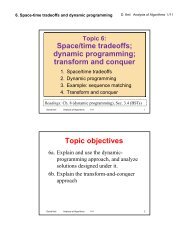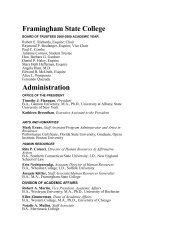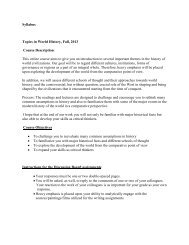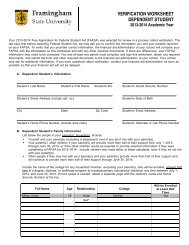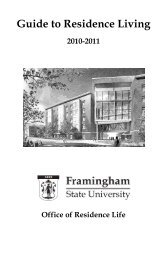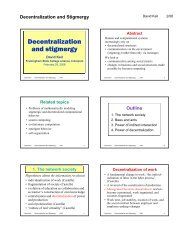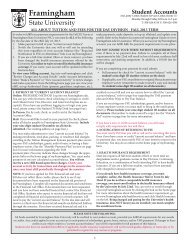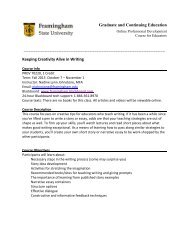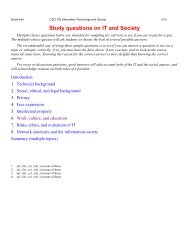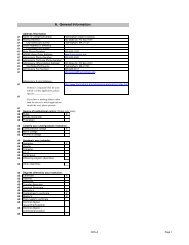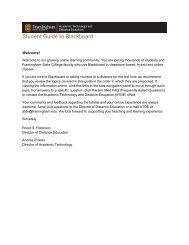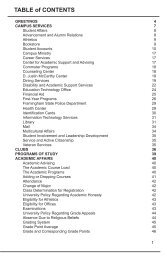The Self Imprisoned Clarissa Dalloway - Framingham State University
The Self Imprisoned Clarissa Dalloway - Framingham State University
The Self Imprisoned Clarissa Dalloway - Framingham State University
You also want an ePaper? Increase the reach of your titles
YUMPU automatically turns print PDFs into web optimized ePapers that Google loves.
<strong>The</strong> <strong>Self</strong> <strong>Imprisoned</strong> <strong>Clarissa</strong> <strong>Dalloway</strong><br />
Mellissa Worster<br />
Department of English<br />
<strong>The</strong> protagonist of the book Mrs. <strong>Dalloway</strong> by Virginia Woolf exists as a character<br />
intended to reveal the previously unexposed truths of a woman‟s struggle to find her<br />
identity within a patriarchal society. Instead of embracing her strengths, and evolving<br />
past what is expected of her as a woman in the early 20 th century, <strong>Clarissa</strong> <strong>Dalloway</strong><br />
meagerly examines the conditions of her life and resignedly submerges herself beneath<br />
the shallow façade of “the perfect housewife.” <strong>The</strong> struggle she experiences with<br />
pinpointing her identity throughout the novel stems from her constant manipulation of<br />
the truth in her own mind more than any influence of the male dominated society she<br />
lives in.<br />
<strong>The</strong> choices that <strong>Clarissa</strong> makes both in her youth and in her elder years have a heavy<br />
influence over her feelings of failure and impounded identity. At every turn, <strong>Clarissa</strong><br />
elects to take the path of comfort over one that she perceives as higher in moral ground.<br />
She chooses material status over love, ignorance over intelligence, and passive voice<br />
over conscious objective. <strong>The</strong> decisions she makes plague her conscience because of<br />
the one-dimensional life that results. <strong>Clarissa</strong> admits, within the first ten pages in this<br />
work of fiction, that she “had the oddest sense of being herself invisible, unseen;<br />
unknown …” (Woolf 202), and that the only thing left of her “is being Mrs. <strong>Dalloway</strong>; not<br />
even <strong>Clarissa</strong> anymore; this being Mrs. Richard <strong>Dalloway</strong>” (Woolf 202).<br />
However, she can never claim full responsibility for her circumstances without<br />
unraveling the delusion she forms for herself. <strong>The</strong> book opens with her morning journey<br />
through the streets of London. As she narrates her steps, the reader gets a sense of<br />
<strong>Clarissa</strong>‟s mental process. Her inner dialogue toggles between sincere contemplative<br />
reflection and superficial commentary. Every time she nearly reaches personal<br />
epiphany, her own mind distracts her from the essential root of any problem she feels
she has. To avoid prolonged exposure to the hard reality of her life she quickly returns<br />
to her more romantic state of mind. Before the journey‟s end, she is back to focusing on<br />
superficial subjects such as her fascination with Bond St., her uncle‟s position on<br />
gloves, and her daughter‟s resistance to femininity. All through the novel <strong>Clarissa</strong><br />
offsets her negative views with these more surface orientated thoughts.<br />
Since Woolf‟s characterization of <strong>Clarissa</strong> primarily occurs within <strong>Clarissa</strong>‟s own<br />
perspective, it is important to keep in mind that, “first person narratives, in particular,<br />
demand critical scrutiny. Individuals often forget some of the most significant<br />
occurrences in their lives and even lie (to themselves as well as to others) about fears<br />
and desires” (Hall 106). <strong>Clarissa</strong> <strong>Dalloway</strong> should not be trusted to render her own<br />
faults directly. Instead, a proper perspective can be gained when <strong>Clarissa</strong>‟s justifications<br />
are examined.<br />
Her first documented choice to give up any possibility of a strong identity is her decision<br />
to marry Richard <strong>Dalloway</strong> over Peter Walsh, or even to further explore the taboo<br />
relationship that she so often reminisces about with Sally Seaton: “For Mrs. <strong>Dalloway</strong> …<br />
erotic love requires too much of one‟s heart and soul; it was far better to marry the<br />
undemanding Richard, who did not care weather she loved him or not, than to risk her<br />
fragile sense of self with the passion of Peter or the purity of Sally” (Magill 1514). This<br />
choice is <strong>Clarissa</strong>‟s first step into the ho-hum shoes she wears in her latter years.<br />
Her decision to marry Richard over Peter also stems from her strong cravings to be a<br />
part of the upper class. It is true that, “most of us (perhaps all but the very wealthiest of<br />
us) are aware that certain material realities help determine the quality of our lives and<br />
the opportunities available to us. Clothing, housing, food, education, and so forth, can<br />
be very costly, and while some individuals enjoy many luxuries, others cannot afford<br />
even basic necessities” (Hall 76). As a result of her upbringing, combined with the time<br />
period‟s restrictions on a woman, <strong>Clarissa</strong> saw fit to secure her social standing at an<br />
early age.
As a young woman, <strong>Clarissa</strong> could not bear the thought of living in poverty. This anxiety<br />
is the precise reason <strong>Clarissa</strong> begins to make decisions that ultimately leave her life<br />
feeling superficial. However, in later reflections, she imagines that life is actually easier<br />
for the poor. Compared to her own life, <strong>Clarissa</strong> visualizes poverty as freeing because<br />
there are significantly less social values to uphold. Yet, <strong>Clarissa</strong> centers her life on<br />
lavish parties and pleasing the rich. She cannot let go of her desire to be admired.<br />
Donald Hall comments on one possible explanation for this:<br />
An important concept in Marxist analysis is that of the “commodity fetish,” which refers<br />
most specifically to our attribution of intrinsic value to commodities without recognition of<br />
the labor that produced them. But the term “fetish” can also point to the magical<br />
qualities associated with buying or owning a particular commodity- how we invest a<br />
purchase or possession with the power to make us happy, secure, or complete. In doing<br />
so, we sometimes come to value commodities even more highly than other human<br />
beings. (Hall 76)<br />
This is the reason that <strong>Clarissa</strong> ultimately can never choose the more difficult life of<br />
poverty, and she can never grow to accept her daughter‟s tutor, Miss Kilman, as a<br />
respectable human being. She has placed the value of commodity even over the value<br />
of herself.<br />
<strong>Clarissa</strong>‟s mixed emotions toward Miss Kilman afflict her throughout the novel. Only<br />
when <strong>Clarissa</strong>‟s mind comes upon thoughts of her antagonist does she find an avenue<br />
to recognize her own downfall. When her erroneous views of Miss Kilman will not be<br />
quieted, <strong>Clarissa</strong> finally begins to see the reality of her own mindset. “Nonsense,<br />
nonsense! she cried to herself,” in an attempt to push away these “monstrous” feelings<br />
(Woolf 204).<br />
To make herself feel better, <strong>Clarissa</strong> explains away these negative feelings by blaming<br />
poverty ridden Miss Kilman herself for their existence: “and how she dressed, how she<br />
treated people who came to lunch she did not care a bit, it being [<strong>Clarissa</strong>‟s] experience
that religious ecstasy made people callous … so insensitive was she, dressed in a<br />
green mackintosh coat” (Woolf 203). <strong>The</strong>se superfluous justifications for the origins of<br />
her feelings are an example of how:<br />
Dominant groups invariably have a rationale to justify their positions of power. <strong>The</strong><br />
theoretician Antonio Gramsci used the term „hegemony‟ to describe how powerful social<br />
groups „naturalize‟ their domination of others. Unlike „ideology,‟ which refers to a specific<br />
set of beliefs, „hegemony‟ refers to the system of interlocked institutions, practices,<br />
world views, expectations, hopes, and fears, as well as specific ideologies, that make<br />
the status quo and the stratification of power and economic resources within that status<br />
quo seem natural and unchallengeable. (Hall 77)<br />
<strong>Clarissa</strong> consistently attempts to justify the birth of such demeaning emotions but can<br />
come up with no clear solution to quell them.<br />
Another aspect of why <strong>Clarissa</strong> hates Miss Kilman is because <strong>Clarissa</strong> is jealous. Her<br />
jealousy begins with <strong>Clarissa</strong>‟s desire for respect and intellectual integrity. This is<br />
another example of a wrong choice she thinks she has made. Miss Kilman possesses<br />
both intellectual and spiritual integrity. <strong>The</strong>se are characteristics that <strong>Clarissa</strong> was never<br />
able to attain in her pursuit of comfortable life. “Oh if she could have her life over again!”<br />
<strong>Clarissa</strong> exclaimed to herself, “she could have looked even differently!” (Woolf 202).<br />
In <strong>Clarissa</strong>‟s view, it is too late for her to achieve this type of status. This contributes to<br />
her overall sense of failure because both her husband and her daughter, Elizabeth, see<br />
her as a common housewife. Neither of them can understand why throwing parties has<br />
become so very important to <strong>Clarissa</strong>. Woolf has used this trait in <strong>Clarissa</strong> to examine<br />
the social norms of her society, “the class-interested critic will first establish the class<br />
identity of the text‟s major and minor characters and then investigate how those<br />
identities help account for attitudes, actions, hopes, and fears- in sum, how they<br />
contribute to the explicit or implicit themes and messages of the text. (Hall 80)
Woolf intended <strong>Clarissa</strong>‟s personality to expose underlying themes of the upper class in<br />
their ostentatious nature. <strong>Clarissa</strong>‟s obsession with her own social standing becomes<br />
subject to ridicule to those around her thereby creating a context for Woolf‟s social<br />
commentary.<br />
With this novel, Woolf intended to make her contribution to society by attracting<br />
“attention to the material conditions of life [thereby initiating] a critical engagement with<br />
our attitudes about those conditions [that she saw was necessary] for achieving positive<br />
social change” (Hall 76). Virginia Woolf does succeed insofar as she does call attention<br />
to these matters:<br />
… the story prods its readers into contemplating their own value systems;<br />
indeed, Marxist and materialist critics commonly suggest that by becoming<br />
conscious of the many ways in which our lives are affected by material realities,<br />
anxieties, and aspirations, we are better able to change them, to sort out what is<br />
truly important from what is selfish and hallow, and, ultimately, to make the world<br />
a less oppressive place. (Hall 76)<br />
<strong>The</strong> character scenarios that Woolf diagrams, however, fall short of positively identifying<br />
society as the sole contributor to <strong>Clarissa</strong> <strong>Dalloway</strong>‟s circumstances.<br />
Certainly, “deriving its title from the protagonist of the novel, <strong>Clarissa</strong> <strong>Dalloway</strong>, Mrs.<br />
<strong>Dalloway</strong> is first of all a study of character” (Poupard 390). <strong>Clarissa</strong>‟s particular<br />
character, while functioning under her own romanticized ideals, has not been so<br />
altogether oppressed that she was never given the opportunity to make her own<br />
decisions. At any time, <strong>Clarissa</strong> could have taken the path of Sally Seaton and defied<br />
social norms to define her individuality or that of Miss Kilman and educated herself. <strong>The</strong><br />
idea of this plays through her mind repeatedly through the day, written through the span<br />
of the novel, as she prepares for the evening‟s party.
Yet, through the ideals she has chosen to adopt, <strong>Clarissa</strong> remains trapped in her<br />
current life. One could argue that <strong>Clarissa</strong> is in fact a prisoner of her adult life, but this<br />
captivity is the direct result of choices she had the complete free will to make- not the<br />
result of a life that was forced on her. Woolf counterbalances <strong>Clarissa</strong>‟s imprisonment<br />
with the outrageous character Septimus Warren Smith.<br />
Through Septimus, Woolf transforms the scanty identity of <strong>Clarissa</strong>:<br />
Thus, Mrs. <strong>Dalloway</strong>‟s character may be symbolic of purity, sensitivity, and<br />
reason, all of which lead her to accept her life without question, while her double,<br />
Septimus Warren Smith, poignantly represents destruction, apathy, and a<br />
passionate rejection of the fraud of civilization, the needs of love, and the despair<br />
of life itself. <strong>The</strong>ir juxtaposition is at the heart of Woolf‟s attempt to reveal<br />
<strong>Clarissa</strong> <strong>Dalloway</strong>‟s true character as a woman in search for her self, threatened<br />
by the demands of love and apathy, passion and reason. Whereas Smith<br />
commits suicide by leaping out of his apartment window, <strong>Clarissa</strong>‟s is an<br />
emotional suicide that allows her a chance to believe that she is in control of her<br />
self, her nature, her identity. (Magill 1514)<br />
Septimus embodies what <strong>Clarissa</strong> wishes she has the strength to be. That is why she is<br />
so captivated by the knowledge of his death at the end of the novel.<br />
<strong>Clarissa</strong> never knew this character but she was greatly affected by the news of his<br />
suicide. Septimus‟ candid personality accentuates <strong>Clarissa</strong>‟s passive lifestyle. Where<br />
she keeps her desires and afflictions to herself, he cannot control his outbursts when he<br />
experiences varying emotions. While <strong>Clarissa</strong> never expresses her pain over her<br />
husband‟s emotional, and physical, abandonment, Septimus declares every emotion<br />
with great excitability.<br />
Woolf uses their polarity to magnify the social norms that occur daily:
Septimus‟ suicide compares with <strong>Clarissa</strong>‟s „emotional suicide‟ as a way of<br />
maintaining one‟s freedom from subversion and preserving one‟s integrity, even<br />
against those whom one loves. It is this contradictory vision, coupled with the<br />
psychological realism of the novel and the lyrically woven strings of thought, time,<br />
experience, personalities, identities, love, and madness, that has made Mrs.<br />
<strong>Dalloway</strong> one of the most significant books of the twentieth century. (Magill 1517)<br />
Indeed, these polar individuals have a significant impact on the reader because suicide<br />
of any kind is tragic. <strong>The</strong>se events in both <strong>Clarissa</strong> and Septimus‟ life call to attention<br />
the underlying motif of the early twentieth century:<br />
“Like Irish writer James Joyce‟s Ulysses (1922), this is a „stream-of-<br />
consciousness‟ novel, but the book really illustrates Virginia Woolf‟s notion of the<br />
webs of humanity, love, hate, and even apathy that connect all people. This book<br />
also clearly focuses on the metaphor of „the bubbles of selfhood‟ that surround<br />
people and that even those who love them have difficulty penetrating.” (Magill<br />
1513)<br />
Woolf‟s literature examines the inner struggle of both men and women, of both the rich<br />
and poor classes, in the novel Mrs. <strong>Dalloway</strong>.<br />
Woolf has the ability to:<br />
… explore [her] character‟s social context to see how it defines deviance (either<br />
justly or unjustly in your opinion) and how the character is implicitly or explicitly<br />
judged (or even self-judges) by those sometimes well-hidden norms. Symbols,<br />
colors, imagery, and other textual details may provide clues to the unexpressed<br />
but still powerful tensions or other forces underlying a character‟s actions or<br />
pervading his or her milieu. (Hall 109)
This certifies her as an in depth psychological thinker. She carefully constructed her<br />
manuscript to reflect “consciousness as it first comes into being, bubbling up from the<br />
brain which generates it and constituting the stuff of which character is made” (Poupard<br />
391).<br />
Although, it is certain that “environment also plays a major role in the wide and dramatic<br />
psychological variations that exist among individuals” (Hall 106), in <strong>Clarissa</strong>‟s case, she<br />
was the chief influence in the direction of her own life. As a young adult, she spent a<br />
great deal of time at her uncle‟s Bourton estate. Through her experiences there,<br />
<strong>Clarissa</strong> was exposed to ideas that broke the barriers of social norms. <strong>Clarissa</strong><br />
interacted with the feministic defiance of Sally and the idealistic politics of Peter yet was<br />
ultimately drawn to the conservative personality of Richard. Unlike most women of the<br />
time period, she was aware of the lifestyle paths she could take. Furthermore, having a<br />
choice as to where her life could be directed was a rare luxury for women of the time.<br />
<strong>Clarissa</strong> could have chosen the passionate life of the activist she grows to admire in her<br />
adult life. It would certainly have been a more difficult path, but, in accordance with her<br />
latter day perspective, it would also have been a more fulfilling life to lead. <strong>Clarissa</strong>‟s<br />
ability to choose is the chief reason Virginia Woolf‟s aim falls slightly short of her goal.<br />
Had <strong>Clarissa</strong> been a character who never had a choice, or was never aware of the<br />
possibility of a choice, the overall theme of the book would have been more effective as<br />
a commentary on patriarchal oppression. As it is, the book stands as a social<br />
commentary about inner struggle to find one‟s self. <strong>Clarissa</strong>‟s life task is to face herself<br />
and decide whether she can ever truly be happy considering the choices she makes in<br />
her youth. However, because of her value system, she could never have been happy<br />
living in poverty. She fills her life with dreams of what she cannot have as a scapegoat.<br />
What she should be doing is focusing on the life she does have and examine what she<br />
can salvage from it.
By the end of the novella, <strong>Clarissa</strong> never fully takes responsibility for her own<br />
unhappiness. She never acknowledges that her choice to live a simple and comfortable<br />
life is the primary reason she continues to doubt her self worth. Everyone else in her<br />
life, those she envies and those she despises, have a working portfolio of the important<br />
things they have done. <strong>Clarissa</strong> will never let go of her desire to be admired and loved<br />
by others, despite how superficial their admiration may be. She needs to be validated in<br />
this way in order to feel whole. Had she taken a more sacrificial road in life at the<br />
beginning, she would be able to become fulfilled in a more permanent way. It is by<br />
putting herself first that <strong>Clarissa</strong>‟s life is bound to societal servitude and not because of<br />
the patriarchal society she lives in.<br />
Melissa Worster is an English major and wrote this paper for Professor Horn’s Literary<br />
Studies class. After graduation she would like pursue a writing career as a full time<br />
fiction novelist. One of her other ambitions is to own an organic farm.
References<br />
Hall, Donald E. “Marxist and Material Analysis” Literary and Cultural <strong>The</strong>ory: From<br />
Basic<br />
Principles to Advanced Applications. New York, NY: Houghton Mifflin, 2001.<br />
-- “Psychoanalytic Analysis” Literary and Cultural <strong>The</strong>ory: From Basic Principles to<br />
Advanced Applications. New York, NY: Houghton Mifflin, 2001.<br />
Poupard, Dennis. Twentieth-Century Literary Criticism, Vol. 20. Detroit, MI: Gale<br />
Research, 1986.<br />
Magill, Frank N. Masterplots II: Women’s Literature Series 4. Englewood Cliffs, NJ:<br />
Salem<br />
Press, 1995.<br />
Woolf, Virginia, et al. <strong>The</strong> Mrs. <strong>Dalloway</strong> Reader. Orlando, FL: First Harvest, 2003.


